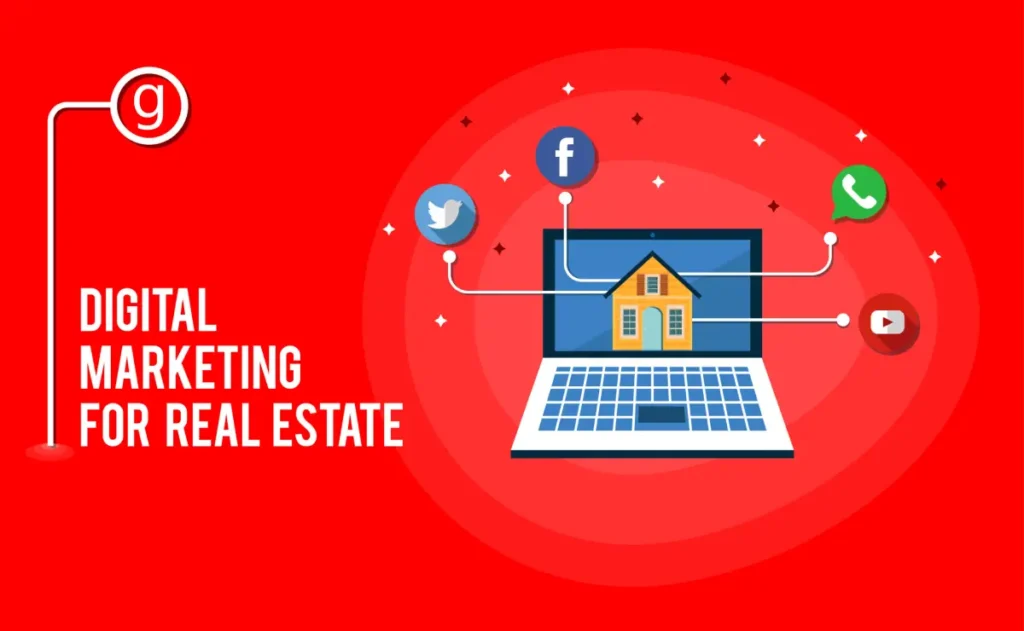The real estate industry is evolving, and so are the strategies used to market properties. With the digital revolution, traditional marketing techniques are no longer sufficient. To stay ahead of the competition and reach potential clients effectively, real estate professionals must embrace digital marketing. This comprehensive guide covers essential strategies, tips, and best practices of digital marketing for real estate.

1. Understanding the Importance of Digital Marketing for Real Estate
1.1 The Shift from Traditional to Digital Marketing
Traditional marketing methods like print ads, billboards, and direct mail have been the backbone of real estate marketing for decades. However, the shift to digital marketing is inevitable due to the increasing number of internet users and the rise of online property searches.
1.2 Benefits of Digital Marketing for Real Estate
- Wider Reach: Digital marketing allows you to reach a broader audience, including international buyers.
- Cost-Effective: Online marketing can be more affordable than traditional methods.
- Targeted Marketing: Advanced targeting options enable you to reach specific demographics.
- Measurable Results: Digital marketing for real estate provides analytics to track your campaign’s success.
2. Building a Strong Online Presence
2.1 Creating a Professional Website
A professional and user-friendly website is the cornerstone of your digital marketing strategy. It should feature high-quality images, detailed property descriptions, virtual tours, and an easy-to-navigate layout. Ensure your website is mobile-friendly, as many users access property listings on their smartphones.
2.2 Implementing SEO Strategies
Search Engine Optimization (SEO) is crucial for improving your website’s visibility on search engines. Use relevant keywords, create engaging content, and optimize meta tags to rank higher in search results. Local SEO is particularly important for real estate, as many searches are location-specific.
2.3 Utilizing Social Media Platforms
Social media platforms like Facebook, Instagram, and LinkedIn are powerful tools for real estate marketing. Use these platforms to share property listings, post engaging content, and interact with potential clients. Paid advertising on social media can also help you reach a targeted audience.
3. Content Marketing for Real Estate
3.1 Blogging
Regularly updating your blog with informative and engaging content can establish you as an authority in the real estate market. Write about market trends, home buying tips, neighborhood guides, and other relevant topics. This not only attracts potential clients but also improves your SEO.
3.2 Video Marketing
Video content is highly engaging and effective in real estate marketing. Create virtual tours, property walkthroughs, and client testimonials to showcase your properties and services. Use platforms like YouTube and social media to share your videos.
3.3 Email Marketing
Email marketing is a powerful way to nurture leads and stay in touch with past clients. Send out newsletters with market updates, new listings, and helpful tips. Segment your email list to send personalized content to different groups of subscribers.
4. Leveraging Online Advertising
4.1 Pay-Per-Click (PPC) Advertising
PPC advertising, such as Google Ads, can drive targeted traffic to your website. Create compelling ad copy and use relevant keywords to attract potential buyers and sellers. Monitor your campaigns and adjust your strategies based on performance data.
4.2 Social Media Advertising
Social media platforms offer robust advertising options. Use Facebook Ads, Instagram Ads, and LinkedIn Ads to promote your properties and services. Advanced targeting features allow you to reach specific demographics, increasing the effectiveness of your ads.
4.3 Retargeting Campaigns
Retargeting helps you re-engage visitors who have previously interacted with your website. Use retargeting ads to remind them of your properties and encourage them to take action. This can significantly increase your conversion rates.
5. Utilizing Real Estate Portals
5.1 Listing on Major Real Estate Portals
Websites like Zillow, Realtor.com, and Trulia are popular among home buyers and sellers. Ensure your properties are listed on these portals to increase visibility. Provide accurate and detailed information to attract potential clients.
5.2 Enhancing Listings with Premium Features
Many real estate portals offer premium features, such as enhanced listings and featured properties. Investing in these options can give your listings more visibility and attract more potential buyers.
6. Analytics and Continuous Improvement
6.1 Tracking and Analyzing Performance
Use tools like Google Analytics to monitor your website’s performance and understand user behavior. Track metrics such as traffic sources, bounce rates, and conversion rates to gauge the effectiveness of your digital marketing efforts.
6.2 Adjusting Strategies Based on Data
Continuously analyze the data you collect to identify areas for improvement. Experiment with different strategies and adjust your campaigns based on performance metrics. Staying agile and responsive to data will help you optimize your marketing efforts.
7. Building Relationships and Trust
7.1 Engaging with Clients Online
Engage with your audience on social media and through your website. Respond to comments, answer questions, and provide valuable information. Building relationships and trust with your audience can lead to increased loyalty and referrals.
7.2 Encouraging Reviews and Testimonials
Positive reviews and testimonials can significantly impact your reputation. Encourage satisfied clients to leave reviews on your website, social media, and real estate portals. Highlight these testimonials in your marketing materials to build credibility.
8. Staying Updated with Industry Trends
8.1 Following Real Estate News
Stay informed about the latest trends and developments in the real estate market. Follow industry news, subscribe to relevant newsletters, and join professional organizations to stay ahead of the curve.
8.2 Adapting to Technological Advances
Technology is constantly evolving, and so are digital marketing tools. Embrace new technologies like virtual reality, AI, and chatbots to enhance your marketing efforts and provide a better user experience.
Conclusion
Digital marketing is essential for real estate professionals looking to succeed in today’s competitive market. By building a strong online presence, creating engaging content, leveraging online advertising, and continuously analyzing your performance, you can attract more clients and grow your business. Stay updated with industry trends and adapt to new technologies to stay ahead of the competition. With the right strategies and a commitment to continuous improvement, you can master digital marketing for real estate and achieve long-term success.

